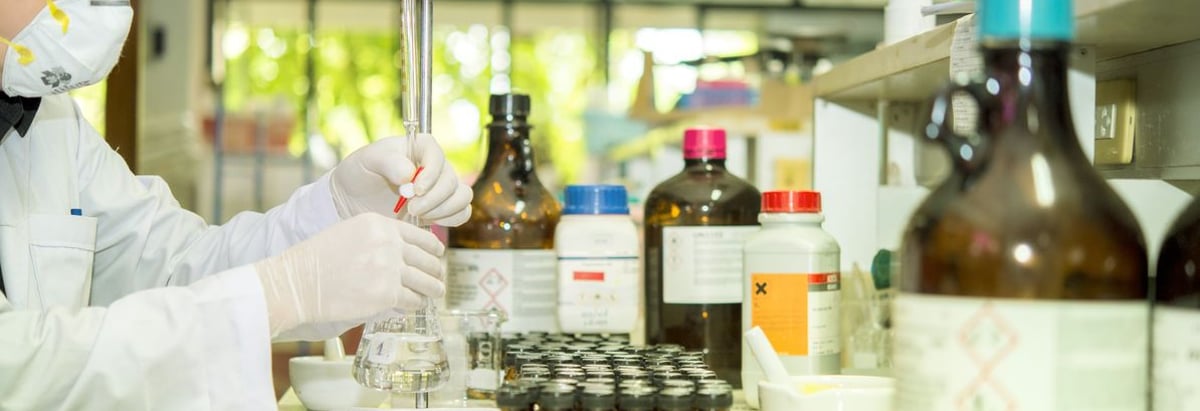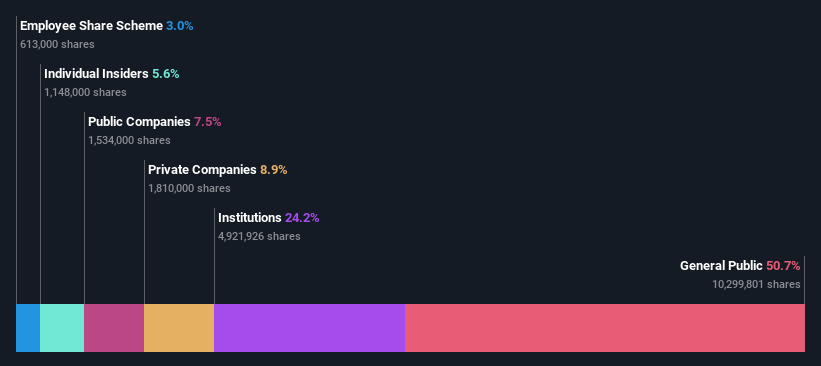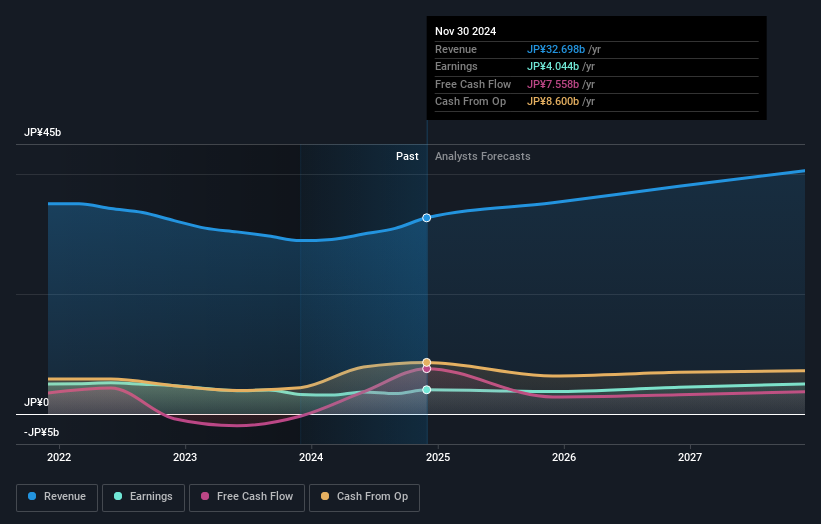Osaka Organic Chemical Industry Ltd.'s (TSE:4187) 11% loss last week hit both individual investors who own 51% as well as institutions

Key Insights
- Osaka Organic Chemical Industry's significant retail investors ownership suggests that the key decisions are influenced by shareholders from the larger public
- The top 25 shareholders own 48% of the company
- Institutional ownership in Osaka Organic Chemical Industry is 24%
A look at the shareholders of Osaka Organic Chemical Industry Ltd. (TSE:4187) can tell us which group is most powerful. With 51% stake, retail investors possess the maximum shares in the company. That is, the group stands to benefit the most if the stock rises (or lose the most if there is a downturn).
While institutions, who own 24% shares weren’t spared from last week’s JP¥6.0b market cap drop, retail investors as a group suffered the maximum losses
Let's delve deeper into each type of owner of Osaka Organic Chemical Industry, beginning with the chart below.
See our latest analysis for Osaka Organic Chemical Industry

What Does The Institutional Ownership Tell Us About Osaka Organic Chemical Industry?
Institutions typically measure themselves against a benchmark when reporting to their own investors, so they often become more enthusiastic about a stock once it's included in a major index. We would expect most companies to have some institutions on the register, especially if they are growing.
Osaka Organic Chemical Industry already has institutions on the share registry. Indeed, they own a respectable stake in the company. This can indicate that the company has a certain degree of credibility in the investment community. However, it is best to be wary of relying on the supposed validation that comes with institutional investors. They too, get it wrong sometimes. If multiple institutions change their view on a stock at the same time, you could see the share price drop fast. It's therefore worth looking at Osaka Organic Chemical Industry's earnings history below. Of course, the future is what really matters.

Osaka Organic Chemical Industry is not owned by hedge funds. Western Red Cedar K.K. is currently the company's largest shareholder with 5.5% of shares outstanding. Meanwhile, the second and third largest shareholders, hold 4.9% and 3.6%, of the shares outstanding, respectively.
A deeper look at our ownership data shows that the top 25 shareholders collectively hold less than half of the register, suggesting a large group of small holders where no single shareholder has a majority.
While studying institutional ownership for a company can add value to your research, it is also a good practice to research analyst recommendations to get a deeper understand of a stock's expected performance. There are plenty of analysts covering the stock, so it might be worth seeing what they are forecasting, too.
Insider Ownership Of Osaka Organic Chemical Industry
The definition of company insiders can be subjective and does vary between jurisdictions. Our data reflects individual insiders, capturing board members at the very least. The company management answer to the board and the latter should represent the interests of shareholders. Notably, sometimes top-level managers are on the board themselves.
Insider ownership is positive when it signals leadership are thinking like the true owners of the company. However, high insider ownership can also give immense power to a small group within the company. This can be negative in some circumstances.
Our most recent data indicates that insiders own some shares in Osaka Organic Chemical Industry Ltd.. As individuals, the insiders collectively own JP¥2.7b worth of the JP¥47b company. Some would say this shows alignment of interests between shareholders and the board. But it might be worth checking if those insiders have been selling.
General Public Ownership
The general public, mostly comprising of individual investors, collectively holds 51% of Osaka Organic Chemical Industry shares. This size of ownership gives investors from the general public some collective power. They can and probably do influence decisions on executive compensation, dividend policies and proposed business acquisitions.
Private Company Ownership
We can see that Private Companies own 8.9%, of the shares on issue. Private companies may be related parties. Sometimes insiders have an interest in a public company through a holding in a private company, rather than in their own capacity as an individual. While it's hard to draw any broad stroke conclusions, it is worth noting as an area for further research.
Public Company Ownership
Public companies currently own 7.5% of Osaka Organic Chemical Industry stock. It's hard to say for sure but this suggests they have entwined business interests. This might be a strategic stake, so it's worth watching this space for changes in ownership.
Next Steps:
While it is well worth considering the different groups that own a company, there are other factors that are even more important. Consider risks, for instance. Every company has them, and we've spotted 1 warning sign for Osaka Organic Chemical Industry you should know about.
But ultimately it is the future, not the past, that will determine how well the owners of this business will do. Therefore we think it advisable to take a look at this free report showing whether analysts are predicting a brighter future .
NB: Figures in this article are calculated using data from the last twelve months, which refer to the 12-month period ending on the last date of the month the financial statement is dated. This may not be consistent with full year annual report figures.
New: AI Stock Screener & Alerts
Our new AI Stock Screener scans the market every day to uncover opportunities.
• Dividend Powerhouses (3%+ Yield)
• Undervalued Small Caps with Insider Buying
• High growth Tech and AI Companies
Or build your own from over 50 metrics.
Have feedback on this article? Concerned about the content? Get in touch with us directly. Alternatively, email editorial-team (at) simplywallst.com.
This article by Simply Wall St is general in nature. We provide commentary based on historical data and analyst forecasts only using an unbiased methodology and our articles are not intended to be financial advice. It does not constitute a recommendation to buy or sell any stock, and does not take account of your objectives, or your financial situation. We aim to bring you long-term focused analysis driven by fundamental data. Note that our analysis may not factor in the latest price-sensitive company announcements or qualitative material. Simply Wall St has no position in any stocks mentioned.
About TSE:4187
Osaka Organic Chemical Industry
Engages in the production and marketing of organic chemistry industry products, organic reagents, petrochemical products, and special polymers in Japan.
Flawless balance sheet with solid track record and pays a dividend.
Market Insights
Community Narratives





